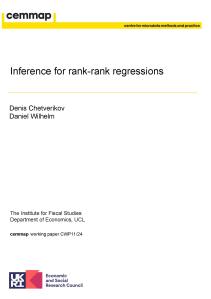Economists are obsessed with rankings of institutions, journals, or scholars according to the value of some feature of interest. These rankings are invariably computed using estimates rather than the true values of such features. As a result, there may be considerable uncertainty concerning the ranks. In this paper, we consider the problem of accounting for such uncertainty by constructing confidence sets for the ranks. We consider both the problem of constructing marginal confidence sets for the rank of, say, a particular journal as well as simultaneous confidence sets for the ranks of all journals.
The purpose of this paper is to review the approach to the construction of such confidence sets by Mogstad et al. (2020) and then apply their methods to rankings of economics journals and universities by impact factors.
Authors

University of Chicago

Research Fellow University of Chicago
Magne is a Research Fellow, a Professor in Economics at the University of Chicago and a co-editor of the Journal of Political Economy.

Research Associate LMU Munich
Daniel is a Research Associate of the IFS in Cemmap and Professor of Statistics and Econometrics at LMU Munich.

Joseph P. Romano
Working Paper details
- DOI
- 10.47004/wp.cem.2022.0722
- Publisher
- cemmap
Suggested citation
Mogstad, M et al. (2022). Statistical uncertainty in the ranking of journals and universities. London: cemmap. Available at: https://ifs.org.uk/publications/statistical-uncertainty-ranking-journals-and-universities (accessed: 30 June 2024).
Grant
Related documents
More from IFS
Understand this issue

Gender norms, violence and adolescent girls’ trajectories: Evidence from India
24 October 2022

What are the challenges in getting debt on a falling path?
28 June 2024

Election Special: Your questions answered
27 June 2024
Policy analysis

ABC of SV: Limited Information Likelihood Inference in Stochastic Volatility Jump-Diffusion Models
We develop novel methods for estimation and filtering of continuous-time models with stochastic volatility and jumps using so-called Approximate Bayesian Compu- tation which build likelihoods based on limited information.
12 August 2014

Assessing the economic benefits of education: reconciling microeconomic and macroeconomic approaches
This CAYT report discusses the strengths and limitations of several approaches to assessing the effect of education on productivity.
14 March 2013

Misreported schooling, multiple measures and returns to educational qualifications
We provide a number of contributions of policy, practical and methodological interest to the study of the returns to educational qualifications in the presence of misreporting.
1 February 2012
Academic research

Inference for rank-rank regressions
28 May 2024

Understanding Society: minimising selection biases in data collection using mobile apps
2 February 2024

The impact of labour demand shocks when occupational labour supplies are heterogeneous
28 June 2024